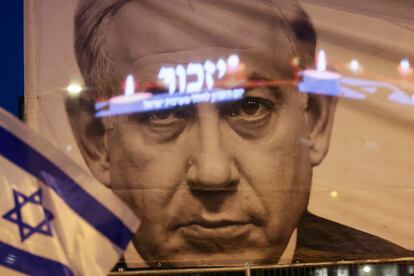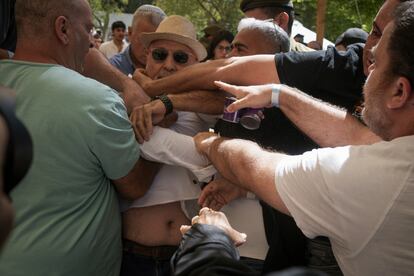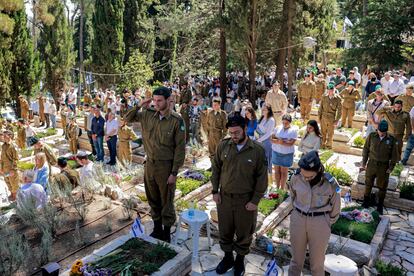Israel turns 75 amid deep divisions and pessimism
The anniversary takes place against a backdrop of protests over Netanyahu’s judicial reform, which has exposed many underlying differences going back decades

In January 1968, seven months after Israel tripled the territory under its control by winning the Six-Day War, the U.S. president at the time, Lyndon B. Johnson, received the country’s prime minister, Levi Eshkol, and asked him: “What kind of Israel do you want?” Eshkol mentioned several determining factors until he ended up admitting: “The government has decided not to decide [...]. Unfortunately, I cannot tell you what kind of Israel I want!” Barely 20 years old, the Jewish State was unsure what it would be when it grew up, still filled with giddiness over the capture of the Gaza Strip, the West Bank, East Jerusalem, the Sinai peninsula and the Golan Heights.
Israel turns 75 on Wednesday, but the nation would still find it difficult to answer Johnson’s question as it grapples with one of the greatest political and social crises in its history. The Jewish population is deeply divided as a result of the judicial reform proposed by the government of Benjamin Netanyahu, and the elephant in the room (the military occupation of Palestine) is almost absent from the public debate, as if the latest escalation of violence were part of the natural state of affairs.
The date of the celebration changes every year. It coincides with the day in the Hebrew calendar when David Ben Gurion, founding father of the country, read the Declaration of Independence in Tel Aviv, which was on May 14, 1948, according to the Gregorian calendar. Both the celebration, which began on Tuesday at sunset, and the one that always precedes it — in memory of the fallen soldiers and the victims of terrorism — are considered by the Jewish majority as dates of unity, first in mourning and then in joy.
This year, however, these events have been marked by a climate of polarization triggered by a reform that seeks to annul the powers of the judiciary in favor of the executive, and which has been met with 16 consecutive weeks of massive street demonstrations. Some ministers and lawmakers from the ruling coalition have canceled their participation in Memorial Day at the request of Yad Labanim, an organization created to honor Israeli war victims and support their families. The controversial Minister of National Security, the far-right Itamar Ben-Gvir, did participate in the event, where there were altercations. Some families honored their deceased first thing in the morning to avoid the politicians, while others organized alternative events.

Opposition leader Yair Lapid did not attend the main Independence Day ceremony on Tuesday night in Jerusalem. The official in charge of organizing it, Transportation Minister Miri Regev, had told the people in charge of the television broadcast that, in the event of protests, they should focus on the public or show footage of the dress rehearsal, which is always recorded in case there are technical problems during the live coverage, according to local media reports.
Israel turns 75 in an atmosphere of pessimism. According to a survey by the public television channel Kan, 48% of Israelis believe that things will get worse in the coming years, while only 20% believe that they will get better. Another poll by Channel 12 places pessimism about the national future at 51%.
Tamar Hermann, a professor of political science at the Open University of Israel and Senior Research Fellow at the Israel Democracy Institute, believes that the crisis over the proposal of judicial reform is “the worst in Israel’s history” because it has exposed many underlying differences going back decades. “All the divisions have come out: between the center and the periphery, between the secular and the religious, between Ashkenazi and Mizrahi…,” she said in a telephone interview.
The more secular and Ashkenazi population (Jews originating from central and eastern Europe) is more closely associated with privilege and the so-called “First Israel,” the one that built the country. The more traditional and Mizrahi population (from the Middle East and North Africa) tend to feel more represented by Likud, Netanyahu’s party, which has governed for much of the last four decades and now has formed the most right-wing coalition in the country’s history with ultra-nationalist and ultra-Orthodox politicians. The reform’s detractors belong mainly to the first group and fear that Israel will end up becoming a dictatorship, while its supporters feel they are treated as “second-class citizens” whose vote is being annulled by the powers that be. Meanwhile, Palestinians with Israeli citizenship, a fifth of the population and structurally discriminated against, have remained mostly on the sidelines of the brawl.
Warnings
Newspaper records show that doomsday warnings are nothing new in Israel. And figures prove that the country is experiencing quite an enviable “old age.” According to data released on Monday by the Central Statistics Office, the population of Israel is close to 10 million (including those who live in the country, in settlements and abroad), thanks to the high birth rates of some population groups and to waves of migration, almost half of which were due to the fall of the Soviet Union.
It also has a thriving economy, based on exports such as weapons, cybersecurity and diamonds. The credit rating agency Moody’s downgraded its economic outlook from “positive” to “stable” last week due to the “deterioration of governance,” but maintained its A1 (medium-high) rating for its “strong economic growth.” Life expectancy (82 years) is among the highest in the world and infant mortality (3 per 1,000) among the lowest, according to data released last week by the Taub Center for Social Policy Studies, based in Jerusalem. Its inhabitants have just climbed to fourth position in the World Happiness Index, only behind Finland, Denmark and Iceland.
Added to this, at the political level, is the low diplomatic price that Israel pays for the military occupation of Palestine and for the construction since 1968 of dozens of settlements in occupied territory, where some 500,000 settlers already live. Not only does it retain its traditional support from the United States (despite the differences between Netanyahu and Joe Biden) and cooperation agreements with the EU, but its position within the Arab world has also improved. In 2020, the United Arab Emirates, Bahrain and Morocco recognized Israel, breaking the Arab rule that the normalization of relations would first require progress in peace with the Palestinians. “For the Palestinians, it isn’t; but for the average Israeli, the status quo is quite beneficial,” notes Hermann.
Israel has the most powerful army in the region and, according to the consensus among experts, it also has nuclear weapons. But the country lives in a kind of permanent existential angst, motivated in part by the collective trauma of the Holocaust, in which the Nazis and their allies exterminated six million Jews. In 2016 Tamir Pardo, the outgoing head of the Mossad, the secret services abroad, admitted that the country no longer faces existential threats, yet 62% of Israeli Jews do see it in Iran ― whose leaders advocate the disappearance of Israel ― and 58% support bombing its nuclear facilities, even without the go-ahead from Washington, to prevent Iran from developing atomic weapons, according to a 2021 poll.

It is what Israelis call hamatsav (the situation), amid a growing trend towards the right and religion in the last two decades, which has led to the virtual disappearance of the word peace from the political dictionary. A full 62% of Jewish Israelis consider themselves to be on the right (rising to 70% for those between the ages of 18 and 24); meanwhile, 82 of the 120 lawmakers in the Knesset are somewhere between the center-right and the radical right. Around 40% of Israeli Jews agree with the statement of their finance minister, the ultranationalist Bezalel Smotrich, that “there’s no such thing as the Palestinian people,” according to a poll conducted last month. The founder of Zionism, Theodor Herzl, imagined the future Jewish state as “a bulwark against Asia“ and as “the vanguard of culture against barbarianism.” A century later, Prime Minister Ehud Barak popularized the idea of Israel as “a modern and prosperous villa in the middle of the jungle” of the Middle East.
The latest Gallup poll shows, for the first time, greater support for Palestinians than for Israelis among Democratic voters in the United States, after decades of military occupation and with demographics that portend a more nationalist, religious and illiberal future. The Israeli commentator Carolina Landsmann recently asked herself in the daily Haaretz if her country is blowing out 75 candles in the middle of a health dip or at the genesis of a deeper deterioration in the international arena. And one of the country’s cultural icons, the author and songwriter Yehonatan Geffen, who passed away last week, lamented in 2008 in an interview with Haaretz: “Israel has aged terribly fast. I am the same age as the country, and I look better, don’t I?”
Sign up for our weekly newsletter to get more English-language news coverage from EL PAÍS USA Edition
Tu suscripción se está usando en otro dispositivo
¿Quieres añadir otro usuario a tu suscripción?
Si continúas leyendo en este dispositivo, no se podrá leer en el otro.
FlechaTu suscripción se está usando en otro dispositivo y solo puedes acceder a EL PAÍS desde un dispositivo a la vez.
Si quieres compartir tu cuenta, cambia tu suscripción a la modalidad Premium, así podrás añadir otro usuario. Cada uno accederá con su propia cuenta de email, lo que os permitirá personalizar vuestra experiencia en EL PAÍS.
¿Tienes una suscripción de empresa? Accede aquí para contratar más cuentas.
En el caso de no saber quién está usando tu cuenta, te recomendamos cambiar tu contraseña aquí.
Si decides continuar compartiendo tu cuenta, este mensaje se mostrará en tu dispositivo y en el de la otra persona que está usando tu cuenta de forma indefinida, afectando a tu experiencia de lectura. Puedes consultar aquí los términos y condiciones de la suscripción digital.









































